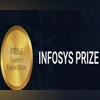Two scientists from IIT-Kanpur, Arun Kumar Shukla and Sachchida Nand Tripathi, along with Science Gallery Bengaluru founding director Jahnavi Phalkey, and National Centre for Biological Sciences (NCBS) professor Mukund Thattai, were among the winners of the Infosys Prize 2023, announced at an event in Bengaluru on Wednesday.
The Infosys Prize holds significance as many of the past awardees have gone on to win international accolades. These include the Nobel Prize for Abhijit Banerjee and Esther Duflo, the Fields Medal for Manjul Bhargava and Akshay Venkatesh, and the Dan David Prize for Sanjay Subrahmanyam, among others.
The Infosys Prize 2023 was awarded in six categories – Engineering and Computer Science, Humanities, Life Sciences, Mathematical Sciences, Physical Sciences, and Social Sciences. The prize for each category comprises a gold medal, a citation, and a prize purse of $100,000. The laureates of the Infosys Prize 2023 were shortlisted from 224 nominations by an international panel of jurors comprising global scholars and experts.
Tripathi, Professor of Sustainable Energy Engineering at IIT-Kanpur, won the prize in the Engineering and Computer Science category for the deployment of a large-scale sensor-based air quality network and mobile laboratory for hyper-local measurements of pollution, data generation, and analysis using artificial intelligence and machine learning for effective air quality management and citizens' awareness.
Phalkey won the Infosys Prize 2023 in Humanities for her insights into the individual, institutional, and material histories of scientific research in modern India. Her work has emphasized the need to see the history of science as much a history of scientific ideas as one of power, practice, and the nation-state.
“In the next four to five years, in my personal research, I hope to have a monograph published in the history of physical sciences,” said Phalkey.
More From This Section
Shukla, Professor of Biological Sciences and Bioengineering at IIT-Kanpur, has won the award in the Life Sciences category for his contributions to the field of G-protein coupled receptor (GPCR) biology. Shukla’s research has established a new understanding of GPCRs, one of the most important classes of drug targets.
Thattai, Professor at the National Centre for Biological Sciences, won the award in the Physical Sciences category for his contributions to evolutionary cell biology. Thattai’s work is expected to have implications in one of biology’s central mysteries of how complex cells emerged from primordial ones.
“We are at a point where huge changes are going to happen in Biology. Most of Biology is totally unexplored. Imagine the deluge of data that is yet to come when we expand our lengths to cover all of life, instead of humans and other organisms we are focused on,” said Thattai.
Bhargav Bhatt, Fernholz Joint Professor at the Institute for Advanced Study and Princeton University, won the award in the Mathematical Sciences category for his outstanding and fundamental contributions to arithmetic geometry and commutative algebra.
In the Social Sciences category, Karuna Mantena, Professor of Political Science at Columbia University, won the prize for her “groundbreaking” research on the theory of imperial rule, and the claim that this late imperial ideology became one of the important factors in the emergence of modern social theory.
“Learnability, creativity, and innovation are the ways to navigate our fast-changing world. We must be daringly inventive to tackle the daunting and persistent problems of today. The laureates of the Infosys Prize have shown us the importance of this adaptive thinking through their approach to problem-solving,” said N R Narayana Murthy, Infosys founder and Trustee of the Infosys Science Foundation.

)
